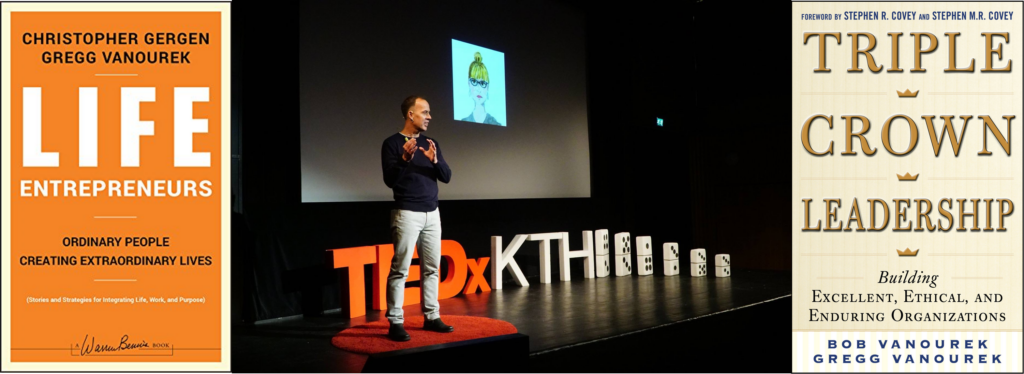Stuck in a job you don’t like? Enduring it? Too often, we do it for the money, the security, or the prestige, but not for its intrinsic value. We stick it out, trapped by golden handcuffs.
Golden handcuffs are financial incentives designed to keep workers at an organization. We may long to leave a job and set out on a new adventure, but the thought of giving up the salary, bonus, or other perks makes us stay.
It helps to view it from our own perspective. Sometimes we place the golden handcuffs on ourselves. They can come in the form of lifestyle choices (regarding possessions and consumption) that inhibit us from doing what we want with our life. We’re financially tethered to a job that’s not a good fit.
There’s nothing wrong with money, or making a lot of it, or enjoying the fruits of our hard work. The problem comes when we’re chained to a job we don’t like and sacrifice our quality of life for huge swaths of time. When we’re stuck with a manager we don’t respect or can’t stand. Or at an organization with a poor culture, or toxic employees. When we’re stressed or burned out but feel trapped.
We may feel stuck due to our fear of the unknown. Or we fear a loss of status, or the judgment of others if we make a change.
What’s Really Going On
These decisions have many factors. We have expenses. There are things we want to do in life, and they cost money. We have bills to pay. We have a family to feed, or trips we’ve been dreaming of, or kids’ college and retirement to save for. Fair enough.
But we rationalize. We accept other people’s definition of success and live on their terms instead of our own. We make big decisions based on the assumption that success is the point of life—or that status will give us what we want.
In many cases, the problem is compounded by overconsumption and “lifestyle creep”: when our expenses or spending go up as our discretionary income increases.
Too many of us are living paycheck to paycheck (54% of U.S. consumers, according to recent data). According to a 2021 CNBC report, the average American has $90,460 in debt. People want that bigger house, that nicer car, that better neighborhood. They struggle to keep up with mortgage payments, car loans, credit card debt, student loans, and more.

Quality of Life Assessment
Evaluate your quality of life in ten key areas by taking our assessment. Discover your strongest areas, and the areas that need work, then act accordingly.
Related Traps & Articles
Golden handcuffs may be a problem for many reasons. Our life and work choices are complex. Related traps include:
- Wrong Path: pursuing a path that doesn’t align with your values and aspirations
- Climbing mode: focusing so much on climbing the ladder of success, and on achievement and advancement, that we never take time for discovering who we are, what we love, and what we long to do in the world
- Conform: conforming to societal conventions or conventional paths instead of blazing our own path in life
- Ego: being self-absorbed and caught up in our own stuff, without focusing on something larger than ourselves
- Emptiness: feeling empty about what we’re doing
- Outer-driven: being driven by the expectations of others
- Prestige: hunger for status, prestige, or approval
- “Hedonic treadmill”: the tendency to remain at a set level of happiness despite a change in fortune or the achievement of goals
- Comparison Trap: constantly comparing ourselves to others and judging our worth by how we stack up on superficial metrics
- False Metrics of Success: measuring success in cold and calculating ways, such as income, net worth, position, power, or number of followers
- Inertia: sticking with a sub-optimal path, often because the switching costs are so high
- Not Moving On: holding on too long to a bad situation or relationship and not moving forward
- Short Game: failing the invest in the future and deciding important things without considering the long term
- “How to Improve Your Financial Health”

Take the Traps Test
We all fall into traps in life. Sometimes we’re not even aware of it, and we can’t get out of traps we don’t know we’re in. Evaluate yourself with our Traps Test.
What to Do about It
OK, we know that golden handcuffs can be a big problem. What to do about it?
First, reduce spending and start saving to free up some margin in your life.
“Do not save what is left after spending; instead spend what is left after saving.”
-Warren Buffett, chairman and CEO, Berkshire Hathaway
Second, build up not only your emergency fund but also your cash runway for when you want or need to make a work change. When Seth Goldman was a young professional working in finance, he was “living lean” and driving an old car and foregoing the amenities that his friends were spending a lot of money on. By doing so, he was able to give himself a much longer runway when he decided to take the entrepreneurial leap and start his company, Honest Tea.
Third, invest in yourself—in your knowledge and skills, and in your network. Such an investment pays the biggest dividends over time.
Fourth, go out and do some “life design interviews”: find people you admire who do work that interests you and ask them about their career path and life trajectory, including what they do and how they got there.
Fifth, spend time with new people in the fields you’re interested in exploring—learning new things and adopting new mindsets. Sometimes the people in our current situation are the ones holding us back.
Sixth, recognize that the career design and change process is usually messy and iterative, not a quick and clear process. Get curious and active. Embrace the transition process with all its possibilities and mysteries—including the possibility of recrafting your current work to be a better fit and a source of meaning and fulfillment as well as income.
Seventh, play it smart—with a healthy balance between wisdom and urgency. Don’t jump off a financial cliff. Invest thought and time in a smart process. At the same time, don’t wait too long. (The more common mistake is waiting too long—or never making a change—not moving too quickly.)
Finally, once you’ve decided your new direction, be bold and take massive action. Be flexible with approach, since reality rarely lines up with our plans, but show faith in your convictions.
Work comprises a huge part of your life. Why not craft it according to your values and aspirations?
Reflection Questions
- Are you trapped by golden handcuffs?
- If so, how long have you been in this trap?
- What will you do about it, starting today?

Personal Values Exercise
Complete this exercise to identify your personal values. It will help you develop self-awareness, including clarity about what’s most important to you in life and work, and serve as a safe harbor for you to return to when things are tough.
Tools for You
- Traps Test (Common Traps of Living) to help you identify what’s getting in the way of your happiness and quality of life
- Personal Values Exercise to help you clarify what’s most important to you
- Quality of Life Assessment so you can discover your strongest areas and the areas that need work, then act accordingly
Related Articles
- “The 7 Most Common Career Regrets (And What They Tell Us)“
- “Time to Check the Path You’re On?”
- “Are You Trapped by Success?”
- “Why We Stay in Bad Jobs Too Long”
- “The Perils of ‘Climbing Mode’ in Our Career”
- “How Inertia Keeps Us from Making Needed Changes”
- “The Trap of Thinking It’s Too Late for Big Things in Our Lives”
- “The Trap of Deferring Dreams and Postponing Happiness”
- “The Trap of Caring Too Much about What Other People Think”
- “The Trap of Living Someone Else’s Life”
- “Tired of Settling? How to Light Your Life and Work on Fire”
Postscript: Inspirations for Escaping the Golden Handcuffs
- “It’s better to fail trying to do what you really care about than to succeed at something else.” -Mark Albion
- “Work can provide the opportunity for spiritual and personal, as well as financial, growth. If it doesn’t, we are wasting far too much of our lives on it.” -James A. Autry
- “So many of us choose our paths in life out of fear disguised as practicality.” -Jim Carrey
- “I don’t have a problem with what you do, that’s your choice. What I have a problem with is you lying to yourself about why you’re doing the things you’re doing. You have a choice.” -Jerry Colonna
- “If the ladder is not leaning against the right wall, every step we take just gets us to the wrong place faster.” -Stephen R. Covey
- “Every worker needs to escape the wrong job.” -Peter Drucker
- “Money sometimes costs too much.” -Ralph Waldo Emerson
- “For too long we have been dreaming a dream from which we are now waking up: the dream that if you just improve the socio-economic status of people, everything will be OK, people will become happy. The truth is that as the struggle for survival has subsided, the question has emerged: survival for what? Ever more people today have the means to live, but no meaning to live for.” -Victor Frankl
- “And then there is the most dangerous risk of all—the risk of spending your life not doing what you want on the bet you can buy yourself the freedom to do it later.” -Randy Komisar

Crafting Your Life and Work Course
Regain clarity, direction, and motivation for your next chapter, starting with a powerful foundation of self-awareness and commitment to your values and aspirations.
+++++++++++++++++
Gregg Vanourek is a writer, teacher, and TEDx speaker on personal development and leadership. He is co-author of three books, including LIFE Entrepreneurs: Ordinary People Creating Extraordinary Lives (a manifesto for living with purpose and passion) and Triple Crown Leadership: Building Excellent, Ethical, and Enduring Organizations (a winner of the International Book Awards). He has worked for market-leading ventures and given talks or workshops in 8 countries. Check out his Crafting Your Life & Work online course or get his monthly newsletter. If you found value in this article, please forward it to a friend. Every little bit helps!


